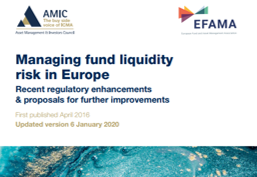EFAMA agrees with the FSB that market participants should integrate the management of margin and collateral calls into their risk management, governance, and operational processes.
Management Companies
EFAMA has been looking at legislative proposals with a direct impact on asset management companies and services, and closely follows any regulatory developments of critical importance to the sector. In addition to issues related to risk management and financial stability, high up on the agenda of EFAMA members is the framework for a prudential regime for Investment Firms (IFD/R), and related implementing measures directly descending from such framework.
EFAMA is focused on minimising the impact of the rules on asset management companies, in particular those holding a limited MiFID license. Key to the sector is the need for proportionality, especially firms that are not authorised to hold client money/securities, or to deal on their own account.
FSB consultation on liquidity preparedness for margin calls in non-bank financial intermediation
Tweaking the AIFMD/UCITS Framework
EFAMA welcomes the decision of the European Commission to adopt a targeted approach in its review of the Alternative Investment Fund Management Directive (AIFMD), along with key harmonising provisions within the Undertakings for Collective Investment in Transferrable Securities Directive (UCITSD). This focus on targeted improvements recognises the role this framework has played in encouraging the growth in the European Alternative Investment Fund (AIF) market over the past decade and its resilience even throughout recent market stresses.
FATF Consultation on Recommendation 24
EFAMA welcomes the work of the FATF in reviewing and reinforcing its existing recommendations to ensure that these remain fit for purpose in tackling global financial crime.
EFAMA reacts to IOSCO statement on liquidity risk management for investment funds
EFAMA welcomes the recent statement by Ashley Alder, IOSCO Board Chair, on liquidity risk management for investment funds.
Liquidity and counterparty risks in ETFs
EFAMA recently finalised a  Comment Paper in response to the ECBs November 2018 findings around liquidity and counterparty risks in ETFs, included in the ECBs semi-annual Financial Stability Review.
Comment Paper in response to the ECBs November 2018 findings around liquidity and counterparty risks in ETFs, included in the ECBs semi-annual Financial Stability Review.
EFAMA welcomes final agreement on legislation facilitating cross-border distribution of funds
We welcome yesterday's vote by the European Parliament plenary, formally adopting the trilogue agreement on the Commission's initiative to remove cross-border barriers to the distribution of investment funds.
This marks a decisive recognition of the need to postpone the application of the PRIIPs disclosure regime for UCITS by two years, in light of the regime's documented shortcomings. It also allows the European Commission more time to conduct a thorough review of the same within one year.
Annual Review June 2019-June 2020
"It gives me great pleasure to provide you with an overview of our activities since our Annual General Meeting in Paris last year. While we were very much looking forward to hosting you all in Brussels this week, the current crisis and associated travel restrictions has forced us to improvise and turn our meeting into a virtual AGM.
Investment Funds Distributor Due Diligence Questionnaire
Funds face unique challenges in performing intermediary oversight, and especially so because of MiFID II requirements, changing regulatory landscapes, and the absence of an industry agreed-upon standard between funds and their distribution channels. To help address these challenges, a dedicated working group developed a uniform due diligence questionnaire (DDQ) that will serve as the standard for investment funds (UCITS and AIFs) in performing onboarding and ongoing oversight of distribution channels.
AMIC EFAMA Report - Managing fund liquidity risk in Europe - 2020
In 2019, AMIC and EFAMA decided to update their 2016 report “Managing Fund Liquidity Risk in Europe” following important policy and regulatory developments at EU and international levels. The purpose of this updated report is to outline the practical liquidity risk management processes which fund management companies put in place when setting up a fund and implement throughout the life of the fund. Also, the report describes the existing European and international regulatory frameworks in the area of fund liquidity risk management.


































